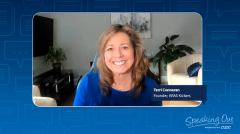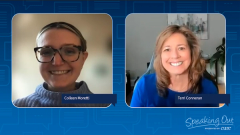
Don’t Sneak Around a Second Opinion During Lung Cancer
As a part of its Speaking Out Video series, CURE® spoke with Terri Conneran, on behalf of KRAS Kickers, about the importance of second opinions during a lung cancer diagnosis.
Transcription:
Colleen Moretti: What does a second opinion entail for a patient with lung cancer?
Terri Conneran: It starts with asking for the second opinion. And it shouldn't be something that you're sneaking around about — this isn't like you're sneaking around on your longtime spouse or something. This is a matter of just talking to your doctor saying, “You know what, let's get a second opinion, let's get another set of eyes on this at a different center.” Going and see a specialist that has lung cancer, that's all they focus on, is so important that you need to be able to go and do it and it's okay to ask. And if your doctor is saying, “I don't know about that,” be more suspicious, because they should want this. They, the doctors, are quite accustomed to what they call peer review, where one doctor talks to another doctor talks to another doctor and this is outside of what they call a tumor board. The tumor board is an in house setting which is different from going to an outside comprehensive cancer center. Those comprehensive cancer centers have specialists that are up to date on the top tier, cutting edge areas of research. And the good news in lung cancer is that research is going so fast that they need to have a specialist.
Moretti: What is the benefit of having a second opinion? How might it hurt a patient is they don’t get a second opinion?
Conneran: Not getting a second opinion let’s start was there. Think of your body is like this fine race car. If I had a Ferrari I want to go and see a specialist. If I was going to spend a lot of money to be there, I'd want to know that I was doing exactly the right thing. Are you willing to risk your one and only body, your one and only mom or dad or sister or brother, with just one opinion or you want to get the second one too? It's that important. And if you choose not to that's on you. I understand the convenience, it's very inconvenient. It's very awkward, it feels a little strange, it feels outside of your comfort zone. But it's important enough to get the full information so you can do what's right. You’re not going to get a second chance. And that's a sad thing to say. That's what you're risking. So, when you have the second opinion, even if they say “Let's do exactly what the first doctor said,” now I have 100% confidence. Now you can go into it knowing that's best. If they give you a different choice, that gives you an opportunity. Now you need to drill down a little bit, but now you know that there's options. And those options can be lifesaving, like literally lifesaving. Oftentimes it ends up being about a biomarker test. Sometimes you're hearing the same information from a second doctor, but you're hearing it in a different way. And that clarity is heartwarming and inspiring to you.
Moretti: How do research hospitals versus actual care play a role here?
Conneran: Truthfully, I was really afraid of research. Before I was diagnosed, my parents are first generation to graduate high school in their family, and so I don't come from that sort of an area at all. I didn't realize that the research that they're doing yesterday is the treatment I'm getting today. And that's exactly what it is that you need to have. Because the research the same way the computers that were walking around with today, I mean 20 years ago, we're just kind of a dream. Cancer care has come that far, the chemo that they do today is different than they then they used to do, they've got to better managed. Chemo is not always the first-choice option. Sometimes you end up on therapy, you may end up on a targeted therapy, you may be radiation or something. There are different options, but you're not going to know as a patient. How would you know unless you go and speak to that research doctor. And that one at comprehensive center, one of the larger centers because they have the depth the research. The same way I'm not going to Bob's garage to go buy a phone. I'm going to go and get, whether I'm team Android or team Apple, I'm gonna go and get one of those. I'm not just gonna go get Bob's platform.
Moretti: How should patients bring up to their primary oncologist that they are going to seek a second opinion?
Conneran: Just spit it out. It's okay to just say that, “Hey I'd love to get a second opinion where do you suggest?” And have the conversation. Your doctor, your oncologist particularly, needs to be on that team. The same way your oncologist may suggest that you go and get a scan, they’re not doing the scam, where they're going and suggesting you get radiation, they're not actually performing the radiation they suggest seeing specialist. You need to go and get that information. But you need to just ask for and that's really what advocacy boils down to asking, you're not going to have the knowledge without having that ask. You can't stop asking. And if you don't understand, ask again.
This transcription has been edited for clarity.






